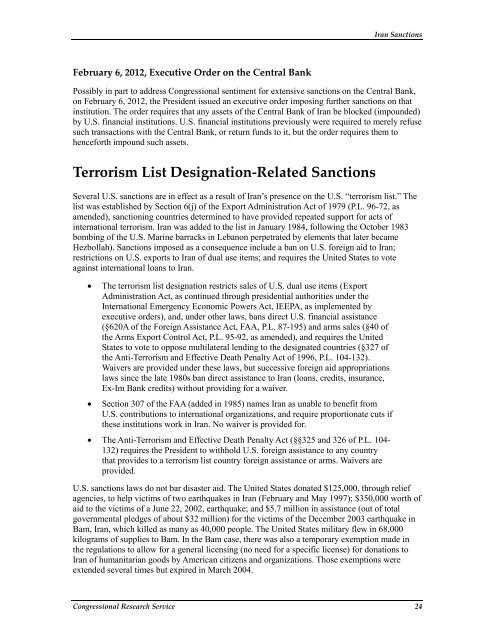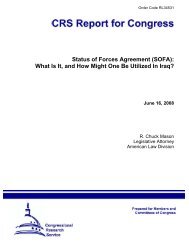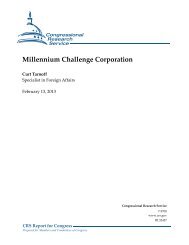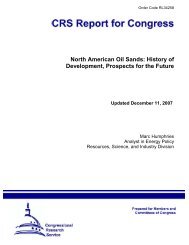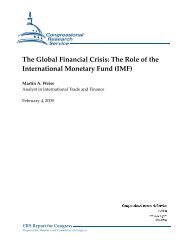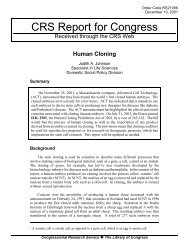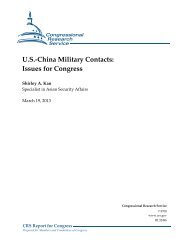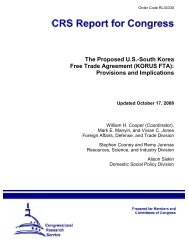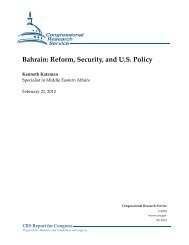Iran Sanctions - Foreign Press Centers
Iran Sanctions - Foreign Press Centers
Iran Sanctions - Foreign Press Centers
You also want an ePaper? Increase the reach of your titles
YUMPU automatically turns print PDFs into web optimized ePapers that Google loves.
February 6, 2012, Executive Order on the Central Bank<br />
<strong>Iran</strong> <strong>Sanctions</strong><br />
Possibly in part to address Congressional sentiment for extensive sanctions on the Central Bank,<br />
on February 6, 2012, the President issued an executive order imposing further sanctions on that<br />
institution. The order requires that any assets of the Central Bank of <strong>Iran</strong> be blocked (impounded)<br />
by U.S. financial institutions. U.S. financial institutions previously were required to merely refuse<br />
such transactions with the Central Bank, or return funds to it, but the order requires them to<br />
henceforth impound such assets.<br />
Terrorism List Designation-Related <strong>Sanctions</strong><br />
Several U.S. sanctions are in effect as a result of <strong>Iran</strong>’s presence on the U.S. “terrorism list.” The<br />
list was established by Section 6(j) of the Export Administration Act of 1979 (P.L. 96-72, as<br />
amended), sanctioning countries determined to have provided repeated support for acts of<br />
international terrorism. <strong>Iran</strong> was added to the list in January 1984, following the October 1983<br />
bombing of the U.S. Marine barracks in Lebanon perpetrated by elements that later became<br />
Hezbollah). <strong>Sanctions</strong> imposed as a consequence include a ban on U.S. foreign aid to <strong>Iran</strong>;<br />
restrictions on U.S. exports to <strong>Iran</strong> of dual use items; and requires the United States to vote<br />
against international loans to <strong>Iran</strong>.<br />
• The terrorism list designation restricts sales of U.S. dual use items (Export<br />
Administration Act, as continued through presidential authorities under the<br />
International Emergency Economic Powers Act, IEEPA, as implemented by<br />
executive orders), and, under other laws, bans direct U.S. financial assistance<br />
(§620A of the <strong>Foreign</strong> Assistance Act, FAA, P.L. 87-195) and arms sales (§40 of<br />
the Arms Export Control Act, P.L. 95-92, as amended), and requires the United<br />
States to vote to oppose multilateral lending to the designated countries (§327 of<br />
the Anti-Terrorism and Effective Death Penalty Act of 1996, P.L. 104-132).<br />
Waivers are provided under these laws, but successive foreign aid appropriations<br />
laws since the late 1980s ban direct assistance to <strong>Iran</strong> (loans, credits, insurance,<br />
Ex-Im Bank credits) without providing for a waiver.<br />
• Section 307 of the FAA (added in 1985) names <strong>Iran</strong> as unable to benefit from<br />
U.S. contributions to international organizations, and require proportionate cuts if<br />
these institutions work in <strong>Iran</strong>. No waiver is provided for.<br />
• The Anti-Terrorism and Effective Death Penalty Act (§§325 and 326 of P.L. 104-<br />
132) requires the President to withhold U.S. foreign assistance to any country<br />
that provides to a terrorism list country foreign assistance or arms. Waivers are<br />
provided.<br />
U.S. sanctions laws do not bar disaster aid. The United States donated $125,000, through relief<br />
agencies, to help victims of two earthquakes in <strong>Iran</strong> (February and May 1997); $350,000 worth of<br />
aid to the victims of a June 22, 2002, earthquake; and $5.7 million in assistance (out of total<br />
governmental pledges of about $32 million) for the victims of the December 2003 earthquake in<br />
Bam, <strong>Iran</strong>, which killed as many as 40,000 people. The United States military flew in 68,000<br />
kilograms of supplies to Bam. In the Bam case, there was also a temporary exemption made in<br />
the regulations to allow for a general licensing (no need for a specific license) for donations to<br />
<strong>Iran</strong> of humanitarian goods by American citizens and organizations. Those exemptions were<br />
extended several times but expired in March 2004.<br />
Congressional Research Service 24


